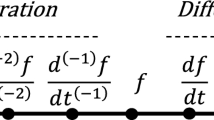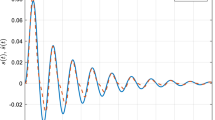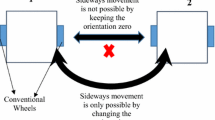Abstract
In this paper, a model for a Quadrotor helicopter has been considered when a fault has been occurred in its actuators. The sliding mode control technique has been utilized as one of a robust passive fault tolerant control methods to control the Quadrotor’s attitude. An adaptive fuzzy system, as a compensator has been used to compensate the estimation error of nonlinear functions and faulty parts. Although increasing the adaptation rate enhances the responding speed, it is accompanied by closed loop system instability. In order to avoid instability and to increase the robustness of the closed loop system, in this paper, a new parallel fuzzy system has been proposed along with a main fuzzy system. The adaptation rules of the main and parallel fuzzy systems were extracted from Lyapunov’s stability theory. During the numerical simulation, the efficiency of the proposed method has been shown against actuator faults.
Similar content being viewed by others
References
A. Tayebi and S. McGilvray, “Attitude stabilization of a VTOL quadrotor aircraft,” IEEE Trans. on Control Systems Technology, vol. 14, no.3, 2006.
S. Bouabdallah and R. Siegwart, “Backstepping and sliding mode techniques applied to an indoor micro quadrotor,” Proc. of IEEE International Conf. on Robotics and Automation, Barcelona, Spain, pp. 2247–2252, April 2005.
A. Kacimi, A. Mokhtari, and B. Kouadri, “Sliding mode control based on adaptive backstepping approach for a quadrotor unmanned aerial vehicle,” Przegla˛d Elektrotechniczny, vol. 88, no. 6, pp. 188–93, Jan. 1, 2012.
M. Bouchoucha, S. Seghour, and M. Tadjine, “Classical and second order sliding mode control solution to an attitude stabilization of a four rotors helicopter: from theory to experiment,” Proc. of IEEE International Conf. on Mechatronics, Istanbul, Turkey, pp. 162–69, April 13-15, 2011.
H. Boudjedir, F. Yacef, O. Bouhali, and N. Rizoug, “Dual neural network for adaptive sliding mode control of quadrotor helicopter stabilization,” International Journal of Information Sciences and Techniques, vol. 2, no. 4, 2012.
Z. T. Dydek, A. M. Annaswamy, and E. Lavretsky, “Adaptive control of quadrotor UAVs: a design trade study with flight evaluations,” IEEE Trans. on Control Systems Technology, vol. 21, no. 4, pp. 1400–1406, July 2013.
F. Sharifi, M. Mirzaei, B. W. Gordon, and Y. M. Zhang, “Fault tolerant control of a quadrotor UAV using sliding mode control,” Proc. of Conf. on Control and Fault Tolerant Systems, Nice, France, pp. 239–244, October 6-8, 2010.
Y. M. Zhang and J. Jiang, “Bibliographical review on reconfigurable fault-tolerant control systems,” Annual Reviews in Control, vol. 32, no. 2, pp. 229–252, 2008. [click]
D. Kim, D. Lee, and K. C. Veluvolu, “Accommodation of Actuator Fault using Local Diagnosis and IMC-PID,” International Journal of Control, Automation, and Systems, vol. 12, no. 6, pp. 1139–1149, 2014. [click]
T. Li, Nonlinear and Fault-Tolerant Control Techniques for a Quadrotor Unmanned Aerial Vehicle, Master’s Thesis, Concordia University, Montreal, Quebec, Canada, 2011.
Q. Hu, Y. M. Zhang, X. Huo, and B. Xiao, “Adaptive integral-type sliding mode control for spacecraft attitude maneuvering under actuator stuck failures,” Chinese Journal of Aeronautics, vol. 24, pp. 32–45, 2011. [click]
Y. M. Zhang, A. Chamseddine, C. A. Rabbath, B. W. Gordon, C.-Y. Su, S. Rakheja, C. Fulfordb, J. Apkarian, and P. Gosselin, “Development of advanced FDD and FTC techniques with application to an unmanned quadrotor helicopter testbed,” Journal of the Franklin Institute, vol. 350, no. 9, pp. 2396–2422, 2013.
L. Wang, C. He, and P. Zhu, “Adaptive Sliding Mode Control for Quadrotor Aerial Robot with I Type Configuration,” International Journal of Automation and Control Engineering, vol. 3, no. 1, pp. 1–7, February 2014. [click]
S. Nadda and A. Swarup, “Development of backstepping based sliding mode control for a quadrotor,” Proc. of IEEE 10th International Colloquium on Signal Processing & its Applications (CSPA2014), Kuala Lumpur, Malaysia, March 7-9, 2014.
J.-J. Xiong and E.-H. Zheng, “Position and attitude tracking control for a quadrotor UAV,” ISA Trans., vol. 53, pp. 725–731, 2014.
H. Yang, B. Jiang, and K. Zhang, “Direct self-repairing control of the quadrotor helicopter based on adaptive sliding mode control technique,” Proc. of 2014 IEEE Chinese Guidance, Navigation and Control Conf., Yantai, China, pp. 1403–1408, August 8-10, 2014.
L. Luque-Vega, B. Castillo-Toledo, and A. G. Loukianov, “Robust block second order sliding mode control for a quadrotor,” Journal of the Franklin Institute, vol. 349, no. 2, pp. 719–739, 2012. [click]
A. Modirrousta and M. Khodabandeh, “A novel nonlinear hybrid controller design for an uncertain quadrotor with disturbances,” Aerospace Science and Technology, vol. 45, pp. 294–308, 2015. [click]
L. Derafa, A. Benallegue, and L. Fridman, “Super twisting control algorithm for the attitude tracking of a four rotors UAV,” Journal of the Franklin Institute, vol. 349, no. 2, pp. 685–699, 2012. [click]
B. Yu, Y. M. Zhang, and Y. Qu, “Fault tolerant control using PID structured optimal against actuator faults in a quadrotor UAV,” Proc. of 2014 International Conf. on Unmanned Aircraft Systems (ICUAS), Orlando, FL, USA, pp. 167–174, May 27-30, 2014.
B. Yu, Y. M. Zhang, Y. Yit, Y. Qu and P. Lu, “Fault detection for partial loss of effectiveness faults of actuators in a quadrotor unmanned helicopter,” Proc. of the 11th World Congress on Intelligent Control and Automation, Shenyang, China, pp. 3204–3209, June 29-July 4, 2014.
A.-R. Merheb, H. Noura and F. Bateman, “Active fault tolerant control of quadrotor UAV using sliding mode control,” Proc. of International Conf. on Unmanned Aircraft Systems (ICUAS), Orlando, FL, USA, pp.156–166, May 27-30, 2014.
V. Lippiello, F. Ruggiero, and D. Serra, “Emergency landing for a quadrotor in case of a propeller failure: a backstepping approach,” Proc. of the IEEE/RSJ International Conf. on Intelligent Robots and Systems (IROS 2014), Chicago, IL, USA, pp. 4782–4788, September 14-18, 2014.
C. L. Hwang and C. Jan, “Fuzzy decentralized slidingmode under-actuated trajectory-tracking control for quadrotor unmanned aerial vehicle,” Proc. of the WCCI IEEE World Congress on Computational Intelligence, Brisbane, Australia, June 10-15, 2012.
H.-Y. Chen and J.-W. Liang, “Adaptive sliding control with self-tuning fuzzy compensation for a piezoelectrically actuated X-Y table,” IET Control Theory and Applications, vol. 4, no. 11, pp. 2516–2526, 2010.
K. Narendra and A. Annaswamy, “A new adaptive law for robust adaptation without persistent excitation,” IEEE Trans. on Automatic Control, vol. 32, no. 2, pp. 134–145, February 1987.
Author information
Authors and Affiliations
Corresponding author
Additional information
Recommended by Associate Editor Bin Jiang under the direction of Editor Ju Hyun Park.
Saeed Barghandan was born in Tabriz, Iran, in February 1979. He received his M.Sc. degree in Control Engineering from K.N. Toosi University of Technology, Iran, in 2004, and his Ph.D. degree in Control Engineering at Science and Research Branch, Islamic Azad University, Tehran, Iran, in 2016. His research interests include MIMO systems, adaptive control, nonlinear control, and intelligent systems.
Mohammad Ali Badamchizadeh was born in Tabriz, Iran, in December 1975. He received his B.S. degree in electrical engineering, an M.Sc. degree in control engineering, and a Ph.D. degree in control engineering from the University of Tabriz, in 1998, 2001, and 2007, respectively. He is currently a full Professor with the Faculty of Electrical and Computer Engineering, University of Tabriz. His research interests include adaptive control, fractional systems, game theory, and system identification.
Mohammad Reza Jahed-Motlagh received his B.Sc. degree in Electrical Engineering in 1978 from the Sharif University of Technology, Tehran, Iran, and his M.Sc. and Ph.D. degrees in Control Engineering in 1986 and 1990, both from the University of Bradford, Bradford, UK. He is currently an Associate Professor of Iran University of Science and Technology, Tehran, Iran. His research interests include complex systems, nonlinear systems, and artificial intelligence.
Rights and permissions
About this article
Cite this article
Barghandan, S., Badamchizadeh, M.A. & Jahed-Motlagh, M.R. Improved adaptive fuzzy sliding mode controller for robust fault tolerant of a Quadrotor. Int. J. Control Autom. Syst. 15, 427–441 (2017). https://doi.org/10.1007/s12555-015-0313-7
Received:
Revised:
Accepted:
Published:
Issue Date:
DOI: https://doi.org/10.1007/s12555-015-0313-7




